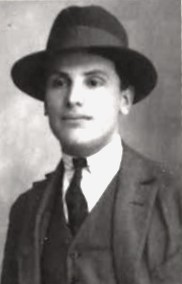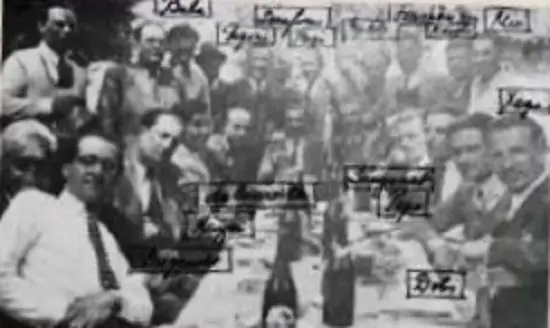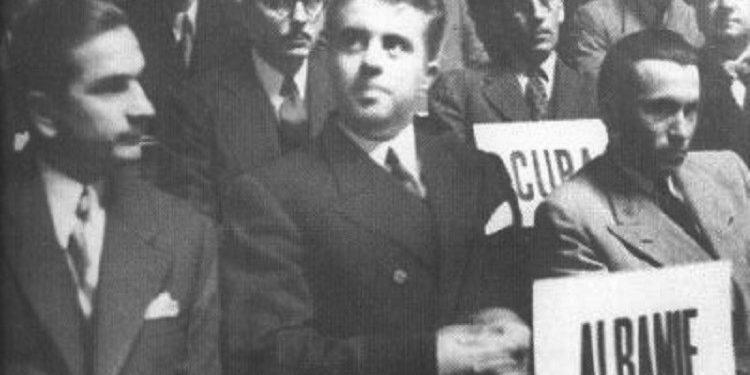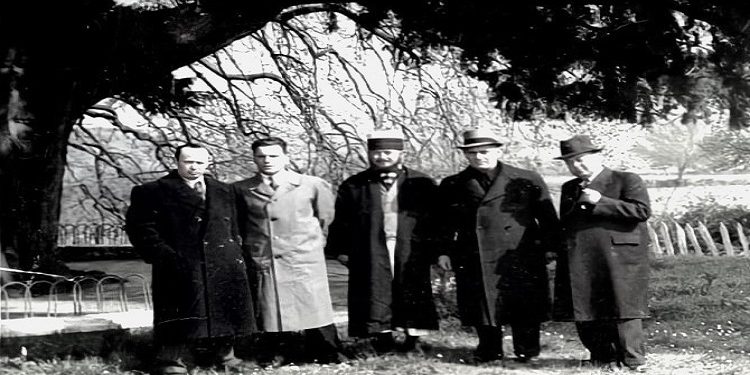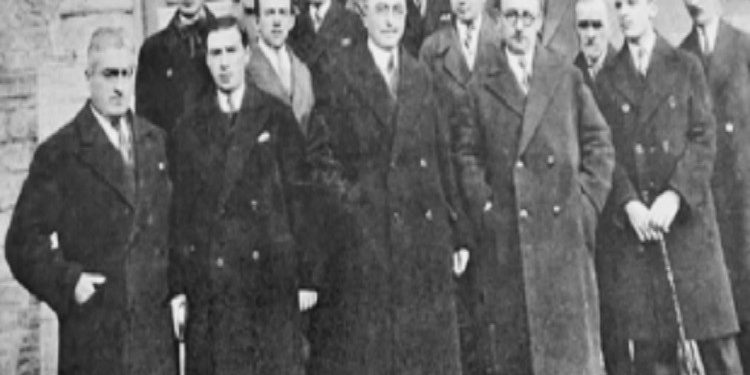By Prof. Nor. Dr. Sonila Boçi
Kristi Kolçe
The first part
-Petraq Peppo: intellectual and historian, in the face of communist indoctrination-
Memorie.al / Mihai Botez, a Romanian intellectual who sought political asylum in the USA in 1988, speaking about the life of an intellectual in a dictatorial system asserted: “It is sometimes said that an intellectual who lives under a communist regime must definitely choose between being ‘the man of the court’, or a dissident. This is an oversimplification. Accepting the social contract (of the communist regime) does not automatically mean that you became a “court man”. Because, under communist dictatorship, there is a sad but true concept called ‘the art of survival’, even in a dignified way, which involves a combination of calculated submission, self-controlled criticism, tactically maintaining a profile of low and intelligent use of opportunities. Certainly to many Western intellectuals, these strategies seem strange, even repulsive. In principle, I am ready to agree with them, expressing my wish that they never need to learn this art”.
Based on the moral and academic values of a person raised and educated in a political system of liberal democracy, the portrait of any intellectual who worked during the communist regime in Albania could raise questions of both scientific and moral nature. The thesis we raise in this mini-study is how an intellectual educated in the West, essentially apolitical, intelligent and ambitious, could find his place in a regime where Marxist-Leninist indoctrination was at the root of everything.
Petraq Peppo is a very interesting character to answer this thesis, as he never showed enthusiasm, but neither hostility, with the regime. He tries to fit in, but sometimes his rebellious spirit doesn’t allow him to do this completely. The study is divided into three parts, which reflect three very important periods in the life history of Petraq Peppos: childhood, family and schooling; his activity during World War II, which largely determined the regime’s behavior towards individuals; and, finally, his activity as part of the Institute of Science.
A large number of documents were used for this study, from a number of funds of the State Archives, from the Archives of the Ministry of Foreign Affairs, as well as from the form files of Petraq Peppos’ colleagues, which are located at the Authority for Information on Former Security Files of the State. Relevant historical literature was also used, both for the character under study and the press of the time. Interview with the family members of prof. Peppos, as well as his colleagues, has made us understand more about the man behind the historian.
Who was Petraq Peppo?
In the southeastern city of Albania, in Korça, the surname Peppo is one of the most popular. Their house in the historical part of the city, near the house of Themistocles Germenjit, was a place of reference for the residents. On June 30, 1903, Petraq Peppo was born in these cobbled streets, in a family of bricklayer craftsmen.
Petraqi was the eldest of the family’s eight children and, time showed, he became an example, followed by his younger brothers and sisters. According to his son, Leonidha, he was the one who encouraged his brothers and sisters to devote themselves to their education and attend higher schools. Peppo’s parents were not rich, but they were the ones who educated each of their children in patriotism, love for work and knowledge.
In 1917, 14-year-old Petraqi was one of the first 36 students to enroll in the Lyceum opened by the French in Korça, one of the elite schools operating in Albania during the First World War and following. He and 9 other students were the first to receive the diploma of the National High School of Korça in 1925. From his school years, his passion for history and literature stood out.
In 1922, he became one of the initiators of the establishment of an association of high school students, which published a magazine with a literary character, called “Shpresa”, whose responsible editor, and then its director, was Petraq Peppo. When she was chosen as its director, Peppoja was in the sixth grade of Lyceum and was only twenty years old. The magazine mainly published translations by French philosophers and writers of all currents. Its issues published pieces by the French Enlightenment, such as: Rousseau, Voltaire, but also from classicist literature, such as excerpts from Moliere’s ‘Dorestrenguari’ (Stingy).
Although he was not inherently politically inclined, at the end of May 1924, Peppoja joined 60 students of the National High School of Korça, who set out in support of the June Movement, led by Monsignor Fan S. Noli, a moment, which Peppoja has constantly considered as one of the high points in his patriotic activity.
In the report he wrote for issue 10-11 of the literary magazine “Shpresa”, it is stated that; it was the ideal that had convinced the lyceums to leave their studies and take up arms. “Holy goal, holier, when a person saves the people from the feudal lords, when he does not let the farmer be a slave and, in the end, when he saves the state”. The contribution of the lyceum students to the movement was only propaganda, as the events turned quickly and by the time the lyceum students entered Tirana, Zogu and his government had left and Noli had taken the prime minister’s seat.
Despite this, the report written by Peppo speaks volumes about the true passions of young Peppo. The descriptions of the places where the revolutionary lyceums had passed, the emphasis on the customs and traditions of the different provinces where they had stayed, the knowledge of the historical material heritage, clearly shows Peppo’s early talent for speech and history.
In search of identity as a historian: Petraq Peppo during the 1930s
Completion of studies at the National High School of Korça coincided with Ahmet Zogu’s return to power, now as president of the Albanian Republic. Young Peppo asked for financial support to continue his higher studies abroad. In 1925, he received a scholarship from the Albanian government and went to study at the Ecole Normale Superieure in Paris, France. In 1929, he graduated in Licences-Lettres (Histoire ET Geographie), received the certificate Ancien Elève de l’Ecole Normale superieure de Paris, as well as the certificate “Diplome de l’Ecole Nationale des Languages Orientales Vivantes de Paris”.
In his biography, Peppoja recalls that, in 1928, Balkanologist Mario Roques asked him for help to set up a course on the Albanian language and Albanian culture for the second time, in the chair where Roques was the head. Thus, for almost a year, the Albanian student served as a lecturer on the Albanian language, history and geography of Albania. His son, Leonidha Peppo, claims that during his personal research on his father’s life as a student in France, he discovered that Peppoja had also taught Albanian language and literature at the University of Lyon.
The completion of his studies brings him back to his hometown, at the National Lyceum of Korça, now in the capacity of professor of history, geography and ancient Greek. In Peppo’s biography, not much is said about his activities during the 1930s. The only event that he has considered worth mentioning is his efforts to introduce the history of Albania as part of the high school curriculum, which was not developed until then.
Research in the Central State Archive shows us that the ambitious young professor, passionate about historical research, had a considerable intellectual and pedagogical activity during the 1930s. There are not a few cases where Petraqi has requested permission from the Ministry of Education to go to Austria, France and Italy, to participate in scientific conferences, or to conduct research in foreign archives on the history of Albania.
In July 1931, he managed to secure permission from the Ministry of Education to participate in a Congress of Educators taking place in Paris. During the years 1935-1939, he made several requests to the Ministry of Education, to visit the archives of Vienna and the Vatican, to collect documents to write a book on the history of Albania.
It seems clear that his interest was in studies of historical and anthropological nature, since on several occasions he sought to make research expeditions to the Arberian colonies of Italy. In 1935, he together with Eqrem Çabeji requested permission from the Ministry of Education to visit Piana dei Grecci in Italy, but failed to secure permission from the authorities for this study trip.
Also, Peppoja has a dense correspondence with a number of personalities of the Albanian culture of the 30s, such as: Lef Nosin, Ilo Mitkë Qafzezin, Mehdi Frashërin, etc. On the basis of these documents and correspondence, Peppo’s interest in studies on the antiquity of Albanians can be clearly read. Particularly interesting is Peppo’s correspondence with the albanologist Lef Nosi, whom he seems to have met for the first time in 1924, when Nosi, as mayor of Elbasan, warmly welcomed the revolutionary lyceum students.
In a letter that Peppoja sends to Nosi from Athens, it is understood that the purpose of his trip is of a study nature. He writes that he had visited the National Library of Athens and that in it he had found information about the history of Albania, which could not be found in the libraries of Paris or the Vatican. Peppoja writes to Nosi with great passion for studies of a historical, ethnographic and linguistic nature that could be developed around the Arvanites of Greece.
“The Arvanites of Greece have taken my notice (attention) with their language full of pictures, where you find Albanian words that we don’t have anywhere. Many words that are entirely Albanian, do not resemble our words, for example in a village near Athens, the Klychi call it ‘rahedera’, a word full of meaning”. In another letter dated July 12, 1937, it seems that relations between Peppo and Nosi have become friendlier.
Peppoja, already in the profile of a young intellectual, tells Nosi about her desire to create intellectual circles in the city of Korça. He also invites Nosi to undertake, together with Mehdi Frashër, a study tour in the villages of Korça, to find data on the codices.
“Listen, dear Lef, – writes Peppo, – Korça, Voskopoja, Vithkuqi, Shipska, etc… apart from archaeological documents – stones, churches, and codices where Albanian chronicles from the 6th century are recorded. I know these vices more or less well, and have enough honest friends, to have the codices at our disposal; for this reason, instead of coming to Pogradec, according to the word, I am inviting you, friend to my house, to come to Korça and so we, Mehdi and I, to places where we can benefit from both health and documents. It seems that we will be a trinity who will agree on beauty, because I, like the kidnapped one who is in the conversation, will be caught with Mehdi and you with your wisdom, you will soften us”.
Unfortunately, we have no way of judging whether these projects of Peppos had any follow-up or not, and whether the expeditions of which he speaks in his letter were carried out or not. Neither in the state archives, nor in the family’s personal archive, can Lef Nosi’s answers to Petraq Peppo be found. He himself, after World War II, never spoke about his acquaintance and collaboration with Nosi, not even in intimate conversations with his family. The declaration of Lef Nos as an “enemy of the people” and his death sentence by the Special Military Court in 1945 put in danger every person who had been close to him. This has apparently forced Peppo to forget his old friend.
The challenges of a professor and patriot, in the years of the Second World War
The story of Petraq Peppos about the years of occupation is as confusing as it is interesting to understand the relationship of man with the truth, under the conditions of a totalitarian system. In his biography, written in the 60s, where Petraq Peppoja tries to argue to the higher authorities of the APS, that, both professionally and politically, he deserved to receive the title of Professor.
He emphasizes only one side of his activity during World War II, his anti-fascist stance, without mentioning anything related to his scientific activity. After the occupation of Albania by Mussolini’s Italy, the political indifference that had characterized his life during the 30s could not continue any longer. After the demonstrations of the students of the Lyceum of Korça, in November 1939, Peppoja was transferred to the ‘Normal’ School in Elbasan.
Fascist officials considered Peppo to be anti-Italian and anti-fascist; “inciter for the rebellion of the students, to whom he spoke with exaltation about France”. He was among the few professors of that time who refused to sign the statements; to join the National Fascist Party. His impulsive and impulsive temperament had made him several times openly oppose the propaganda made by the invaders, according to which Italy had freed Albania from the “regime of the satrap Zog” and that it could bring progress and the solution of the national question Albanian.
According to the testimonies of his colleagues, the opposition of these theses in an open manner caused his imprisonment and exile twice, respectively in the Colfiorito camp near Florence (Italy) in 1941, and in that of Porto-Romano (Durrës), in 1943. Unfortunately, the primary sources for the exile of prof. Peppos in Italy, we could not find them, with the time we had available to carry out this study. In this case, the testimonies of other co-sufferers in the internment camp come to our aid.
According to the memoirs of Ferrik Ferra, the son of Xhemal Ferra, in the prison camp of Kolflorito, where the latter had been interned; “were interned as political opponents of the fascist regime and many well-known Albanian intellectuals, such as professors: Zicoxin Kodra and Petraq Peppo, Tahir Dizdari, Faik Bregu, Tefik Gjyli, Skënder Frashëri, Haki Luzati, Seit Bilali, etc.”
Ferrik Ferra remembers his father’s words: “There in Kolflorito, in the first days of the exile, I remembered that I had left school unfinished and spent all the time I had available among well-known intellectuals, such as professors Zicoxin Kodra and Petraq Peppo , who discussed and debated in that camp where there were many of the cream of the Albanian intelligentsia of that time, whom I listened to carefully”.
According to his son, Leonidha, his exile came after a meeting of the intellectuals of the time with the General Viceroy of Emperor Victor Emanuele III, Francesco Jacomoni. The purpose of this meeting was an attempt to move these intellectuals to the side of fascism. Silence reigned in the hall and Peppoja took the floor; “Who do you tell what fascism is! To whom do you say that fascism liberated Albania?
Your military troops in our country only say occupation; fascism does not bring construction, but captivity. The son adds further; “According to Misto Treska, after the father’s intervention, the whole hall froze. We all stood as if. We did not understand where he found that courage”, – would be the words of Aleks Buda. Even for the second imprisonment of prof. Peppos, the reason would be his opposition to the dogmas of the fascist hierarchs.
The well-known teacher from Korça, Helidhona Fallo, in a statement on October 9, 1951, would recall that during a meeting at the Korça High School, with the Minister of Education, Xhevat Korça, the latter had stated that; “Albania’s independence is assured (since) Albania is protected by Mussolini”. Prof. Peppo, had again had the courage to stand up and say; “Albania is enslaved under fascism and we must try, for Albania’s freedom”.
While his patriotic and anti-fascist attitudes, during the Second World War, are well documented, both by himself and by the words of his family members, who have clearly heard these memories many times, about his activity as researcher and teacher in these years, he has not spoken at all. Archival documentation clearly shows that Peppoja did not abandon his passion for history even during the years of the Second World War. Petraq Peppoja was one of the participants in the 1st Assembly of Albanian Studies, held from April 9-12, 1940, which served as the founding activity for the Institute of Albanian Studies.
During the development of this activity, Peppoja corresponded on several occasions with the Italian archaeologist, prof. Mustilin, which refers only to archaeological discoveries made in Albania by Italian archaeologists, such as: Baldacci, Ugolini, etc. Peppoja reminded him that; “near Treni, Pittard has found Neolithic sites. In Klisyre, sherds from the lacustrine period have been found. Filovi and Vulici, have found Illyrian artifacts in Trebnisht, which prove the thesis of the connection with classical art”.
The mention of the theses of non-Italian archaeologists must not have been welcomed by the leaders of the Institute and the Italian personalities. On October 8, 1940, Peppoja addressed a letter to Mustafa Kruja, the president of the Institute of Albanian Studies, where he announced that he had prepared a conference on the subject; “Albania and its inhabitants during the proto-Illyrian period”, which he wanted to hold in the name of the Institute of Albanian Studies.
He points out that the material he had prepared for this conference was designed in such a way that it could be understood both by “intellectuals who have a broad culture, but also by high school students”. In the answer that Mustafa Kruja returns two weeks later, it is stated that; “the council {of the Institute} decided with a statement that it likes your opinion and that it has to line up the conference there, in the series of conferences that this Institute will organize, at a more convenient time, according to the state of today, it does not seem to us that such conferences attract a lot of public”.
Even after returning from exile in Italy, the professor continued to devote himself to both teaching at the Tirana Gymnasium and writing in the press of the time. He was one of the close collaborators of the magazine “Drini”, which aimed to promote Albanian tourism. On several occasions, he also collaborated with the magazine “Albania / Shqipni”, a monthly magazine of politics, economics, science and literature, which was directed by Ferdinando Guido di Bagno.
In this magazine in March 1942, Peppoja published the article “Albania in prehistory”. An article with a similar theme was published a year later in the magazine “Skhëndija”, which was directed by Ernest Koliqi. Prof. Peppo would not later mention these collaborations and the scientific activity he had developed during the War. He would be silent about these, just as he did not mention his acquaintance with Lef Nos.
Petraq Peppo and the challenge to adapt to the Marxist treatment of history
It is difficult to talk about the positioning of Petraq Peppos with the establishment of the communist regime in Albania. Apart from strong patriotic feelings, Peppoja had never before shown any political preference, either left or right. Petraq Peppos had to face two situations, one more challenging than the other.
As an essentially apolitical man, he would have to adapt to a system of government which considered the mobilization of the masses and their “communist education” as the foundation of survival. As a historian educated in a Western school, he would have to adapt to write history, according to the Marxist school of historical thought, with which he was not familiar.
In his adaptation to the communist regime, it seems that Peppo was helped by several circumstances. First, the acquaintance with Enver Hoxha, who was both a student and a colleague. Both had a shared feeling of love for the French Revolution, despite the fact that Hoxha worshiped the Commune of Paris and the Jacobins, while Peppoja, as it appears in his writings, idolized the Enlightenment. Second, anti-fascism and his imprisonment and exile during the Second World War had secured him some kind of favor with the regime’s leaders. Memorie.al
The next issue follows




